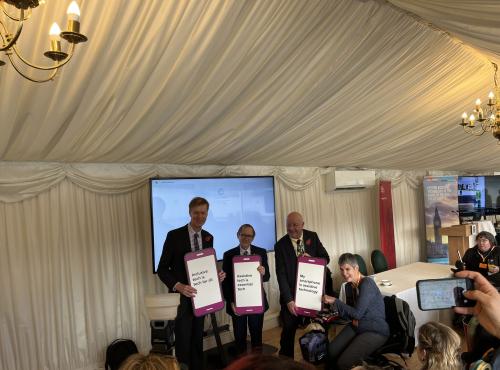General Election Manifestos: Lack of Focus on Circular Economy and Waste Management
The unveiling of party manifestos has provided insight into the varying approaches to waste and resources policy among the major political contenders. While waste and recycling may not dominate headlines or significantly sway voter decisions, these policies are crucial for understanding how each party plans to address the challenges of national sustainability and delivering a circular economy.
The Liberal Democrats
Of the three main parties, the Liberal Democrats have arguably positioned themselves as the most ambitious on waste and recycling. Their commitment to continuing the implementation of a Deposit Return Scheme, and to collaborating with devolved administrations for uniformity across the UK, reflects a proactive stance. Additionally, their ambitions to eliminate non-recyclable single-use plastics by 2027 and end plastic waste exports by 2030 signify a strong environmental focus.
Achieving this transition to affordable alternatives for non-recyclable plastics and overcoming the logistical challenges of halting plastic waste exports will require thorough consideration and robust policy frameworks.
The Conservatives
The Conservative manifesto emphasised continuity with existing initiatives such as a Deposit Return Scheme and the introduction of some new measures targeting waste crime and fly-tipping.
Their pledge to prevent new waste incinerators and revoke permits for those not yet constructed proved surprising. While the Conservatives highlighted their expectation that “increased recycling rates will reduce the need for incineration capacity in the longer term”, they made no pledges in support of policies to improve packaging design and production for recycling, nor to initiatives to ensure this can be properly segregated, collected and processed.
Waste incineration currently supports the UK’s transition away from landfill and this pledge risks weakening the waste management system and damaging the chances of investment in other circular economy infrastructure investments.
A ban at this stage, while the resources and waste sectors undergo much change regarding the complex implementation of Collection and Packaging Reforms, as well as reforms to the Emissions Trading Scheme, is not likely to be well supported by the sector and will make it more difficult for them to operate effectively during this period of change. The Conservative's approach underscores the tension between advancing recycling infrastructure and supporting investor confidence.
Labour
Labour’s manifesto offers very little on waste and recycling policies, providing a lone mention of transitioning to a circular economy, which, while a welcome ambition, falls short of outlining actionable steps or specific targets. In March 2024, Shadow Defra Minister Steve Reed said that Labour would aim for a zero-waste economy by 2050. Unfortunately, this target is missing from the manifesto.
The absence of substantive proposals leaves stakeholders in the waste and recycling sector looking for more definitive commitments, but perhaps the lack of fresh ideas isn't necessarily a drawback. After six years of reforms under the Resources and Waste Strategy (RWS), what the waste and recycling sector arguably needs most from the next government is stability and incremental policy evolution, rather than radical change.
Maintaining momentum on RWS is essential to foster a stable investment climate and crucial for building the infrastructure needed for a more circular, lower-carbon economy. These goals, while not explicitly highlighted in Labour's manifesto, are perhaps implicit in their commitment to a circular economy.
Greens
The Green Party’s manifesto provides a clear focus on producer responsibility and sustainable resources. Their proposals for ten-year warranties on white goods, promoting repair and reuse, and a substantial £30bn investment in research and development for recycling and waste reduction, highlight their clear commitment to a circular economy.
These policies, while forward-thinking, would face implementation challenges, particularly in achieving widespread adoption and ensuring manufacturer compliance. Nonetheless, the Greens’ vision sets out a welcome benchmark for policy approaches to integrating sustainability into industrial practices and delivering a circular economy transition.
Asks for the New Government
We certainly would expect the Green Party to be the most vocal on planning for a circular economy, and we’re encouraged to see clear commitments from the Liberal Democrats as well. However, the absence of comprehensive policies from the two leading parties is a clear obstacle to delivering a circular economy transition. While some parties have made pledges about waste reduction and resource efficiency, the sector requires more detailed and actionable plans to make this a reality.
The next government must prioritise the implementation of robust policies that reduce plastic production, promote reuse and repair, and create green jobs. Comprehensive investment in infrastructure and skills training, along with long-term policy certainty, will be crucial for achieving these goals.
To improve the UK’s resource efficiency and deliver a circular economy, in the first 100 days of the new parliament, we should see:
-
Policy Continuity and Certainty: Consistent and stable policies are essential for fostering investment in recycling and waste infrastructure. Abrupt changes, like those proposed by the Conservatives, risk undermining investor confidence and delaying progress.
-
Advancement of the Resources and Waste Strategy (RWS): Commitment to RWS reforms will support the development of necessary infrastructure, create green jobs, and drive the UK towards a circular, low-carbon economy.
-
Enhanced Producer Responsibility: Policies mandating producer responsibility, such as those proposed by the Greens, should be integrated to encourage sustainable product design and lifecycle management.
-
Promotion of Reuse and Refill Initiatives: Government support for reuse and refill schemes, coupled with legally binding targets for reusable packaging, can significantly reduce single-use plastic waste.
-
Enhanced Green Investment: Increased government green investment to support new green technologies and infrastructures: Increase funding for recycling and reuse infrastructure, ensuring it is sufficient to meet ambitious waste reduction goals.
In conclusion, while each party presents varying degrees of ambition and detail in their waste and resources policies, there is an overarching need for the next government to ensure stability, foster investment, and drive the UK towards a sustainable and circular economy. This hinges on clear, actionable policies that build on existing progress and address the pressing challenges of waste management and resource efficiency.



